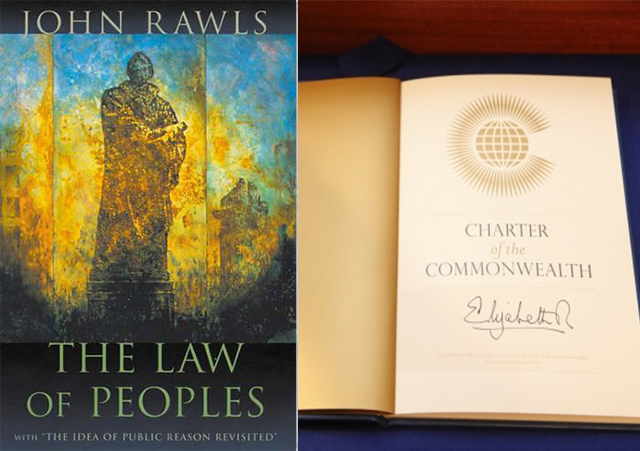 John Rawls' Law of the People and the Commonwealth Charter [sources: Harvard University Press and the Commonwealth Secretariat]
John Rawls' Law of the People and the Commonwealth Charter [sources: Harvard University Press and the Commonwealth Secretariat]
[This is an excerpt from the Hodson Prize winning essay 2019-2020 which appears in full in The Round Table: The Commonwealth Journal of International Affairs.]
The relevant Rawlsian Commonwealth
Given its raison d’être, the Commonwealth has relevance and moral importance in the 21st Century because it delivers a Rawlsian account of global justice. With the Harare Declaration in 1991, and its entrenchment at the Commonwealth Heads of Government Meetings (CHOGM) in Auckland in 1995, and in Edinburgh in 1997, the Commonwealth developed an explicit fundamental political mission and appreciation of the democratic state (Patel, 2000, p. 589). Now, as a qualification for membership, members must commit to ‘the development of free and democratic societies and the promotion of peace and prosperity’ (The Commonwealth, 2013).
If the aim of the Commonwealth is to ‘promote democracy, good governance, peace and the rule of law’, then we find its mission and Rawls’ almost identical (The Commonwealth, n.d.). The Commonwealth, like Rawls’ duty of assistance, does not exist to facilitate a global redistribution of wealth or income. Instead, the Commonwealth exists to develop the same just social situation which Rawls himself advocated for. It works to create just social and political institutions in burdened societies and maintain the integrity of those institutions in well-ordered societies in real and practical ways. Election observations are one of the many examples of this, for which the organisation is lauded (Sives, 2001). In another important way, the Commonwealth acts as a Rawlsian organisation: it insists on the sovereignty of its member states, and encourages ‘home-grown solutions’ and acknowledges ‘the value of regional oversight mechanisms and international support’ (Commonwealth Ministerial Action Group, 2019). As noted above, for Rawls, the purpose of the duty of assistance is to bring a burdened society to a state of independence where they are self-sufficient, and where the assistance ends. While the Commonwealth may also provide ‘opportunities to expand trade and investment between members’ – which Rawls is not opposed to – it is clear that the main intent of the Commonwealth is a social and political one, not monetary (Commonwealth, 2020).
Commonwealth enlargement policy and the duty of assistance
Though the Commonwealth is on the right track, there is a vast amount it can do to improve. The efficacy of the Commonwealth is continually challenged, and several of these criticisms are entirely valid – though I leave these discussions to others. My aim here is to propose an open enlargement policy, which is more inclusive of foreign states. This, properly understood, would work further towards the goal of fighting global injustice according to Rawls’ theory.
If the Commonwealth does find its moral justification in the Rawlsian theory of global justice, as I have argued above, then it must be more inclusive of foreign (non-Commonwealth) states. This is required by the duty of assistance, where well-ordered democratic states have a duty to assist burdened non-democratic states towards a just social situation. For the Commonwealth, this means assisting foreign states who have had no formal, historical or cultural connection to the colonial British Empire, but who may otherwise wish to join the Commonwealth in order to pursue democratic interests. The Commonwealth, then, has a duty to accelerate the enlargement process and to aid non-democratic states in becoming democracies, with stable political institutions and human rights protections.
The precedent to achieve this further requirement of Rawlsian global justice is found in the accession of Rwanda. Rwanda was the first country to become a member of the Commonwealth, which did not ‘fit the traditional Commonwealth template of a country claiming a historical or administrative connection with the United Kingdom or another existing Commonwealth member’ (Banerji, 2010, p. 486). Being the most recent country to join the Commonwealth, in 2009, this makes Rwanda the only member to hold such a status. This, of course, brought controversy with the Commonwealth Human Rights Initiative opposing its membership (Gruenbaum, 2009). The Patterson Committee on Commonwealth Membership did eventually come to the conclusion that ‘a modest expansion in membership would be in the interest of the Commonwealth’s strategic engagement with the wider world’, and permitted Rwanda to join the Commonwealth (House of Commons Foreign Affairs Committee, 2012, p. 119). With this conclusion, the Commonwealth has both incentive and moral obligation to implement an open enlargement policy which accelerates membership into the family.
Kiraan Chetty is the winner of the Harry Hodson Prize-winning essay, 2019-20 and is a Postgraduate student in Philosophy, University of Auckland, Auckland, New Zealand.
Find out more about the Hodson Prize, the Peter Lyon Prize and the Routledge/Round Table Commonwealth Studentship Awards.



